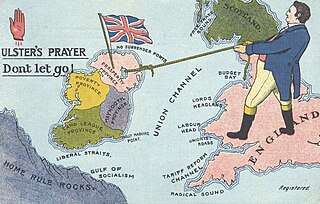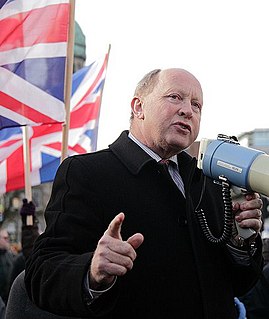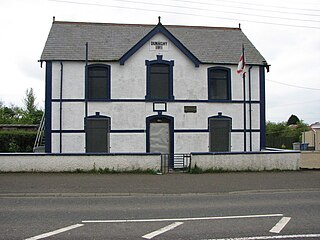Related Research Articles

The Ulster Unionist Party (UUP) is a unionist political party in Northern Ireland. The party was founded in 1905, emerging from the Irish Unionist Alliance in Ulster. Under Edward Carson, it led unionist opposition to the Irish Home Rule movement. Following the partition of Ireland, it was the governing party of Northern Ireland between 1921 and 1972. It was supported by most unionist voters throughout the conflict known as the Troubles, during which time it was often referred to as the Official Unionist Party (OUP).

Ian Richard Kyle Paisley, Baron Bannside, was a Northern Irish loyalist politician and Protestant religious leader who served as leader of the Democratic Unionist Party (DUP) from 1971 to 2008 and First Minister of Northern Ireland from 2007 to 2008.

The Parliament of Northern Ireland was the home rule legislature of Northern Ireland, created under the Government of Ireland Act 1920, which sat from 7 June 1921 to 30 March 1972, when it was suspended because of its inability to restore order during The Troubles, resulting in the introduction of Direct Rule. It was abolished under the Northern Ireland Constitution Act 1973.

Unionism is a political tradition on the island of Ireland that favours political union with Great Britain and professes loyalty to the British Crown and constitution. As the overwhelming sentiment of Ireland's Protestant minority, following Catholic Emancipation (1829) unionism mobilised to keep Ireland part of the United Kingdom and to defeat the efforts of Irish nationalists to restore a separate Irish parliament. Since Partition (1921), as Ulster Unionism its goal has been to maintain Northern Ireland as part of the United Kingdom and to resist a transfer of sovereignty to an all-Ireland republic. Within the framework of a 1998 peace settlement, unionists in Northern Ireland have had to accommodate Irish nationalists in a devolved government, while continuing to rely on the link with Britain to secure their cultural and economic interests.
The Liverpool Protestant Party (LPP) was a minor political party operating in the city of Liverpool in northwest England.

James Hugh Allister is a British Unionist politician and barrister in Northern Ireland. He founded the Traditional Unionist Voice (TUV) political party in 2007, leading the party since its formation. Allister has served as a Member of the Northern Ireland Assembly (MLA) for North Antrim since 2011, and is the TUV’s only representative in the Assembly.
The Ulster Unionist Labour Association was an association of trade unionists founded by Edward Carson in June 1918, aligned with the Ulster Unionists in Ireland. Members were known as Labour Unionists. In Britain, 1918 and 1919 were marked by intense class conflict. This phenomenon spread to Ireland, the whole of which was under British rule at the time. This period also saw a large increase in trade union membership and a series of strikes. These union activities raised fears in a section of the Ulster Unionist leadership, principally Edward Carson and R. Dawson Bates. Carson at this time was president of the British Empire Union, and had been predisposed to amplify the danger of a Bolshevik outbreak in Britain.
The Belfast Labour Party was a political party in Belfast, Ireland from 1892 until 1924.
Norman Porter was a loyalist politician in Northern Ireland.
Catholic Unionist is a term historically used for a Catholic in Ireland who supported the Union which formed the United Kingdom of Great Britain and Ireland, and subsequently used to describe Catholics who support the Union between Northern Ireland and Great Britain.

The Independent Loyal Orange Institution is an offshoot of the Orange Institution, a Protestant fraternal organisation based in Northern Ireland. Initially pro-labour and supportive of tenant rights and land reform, over time it moved to a more conservative, unionist position.

The Loyal Orange Institution, commonly known as the Orange Order, is an international Protestant fraternal order based in Northern Ireland and primarily associated with Ulster Protestants, particularly those of Ulster Scots heritage. It also has lodges in England, Scotland and the Republic of Ireland, as well as in parts of the Commonwealth of Nations, Togo and the United States. The Orange Order was founded by Ulster Protestants in County Armagh in 1795, during a period of Protestant–Catholic sectarian conflict, as a fraternity sworn to maintain the Protestant Ascendancy in Ireland. It is headed by the Grand Orange Lodge of Ireland, established in 1798. Its name is a tribute to the Dutch-born Protestant king William of Orange, who defeated Catholic king James II in the Williamite–Jacobite War (1688–1691). The order is best known for its yearly marches, the biggest of which are held on or around 12 July, a public holiday in Northern Ireland.

Protestant Irish Republicans Nationalists are adherents of Protestantism in Ireland who also support Irish RepublicanismIrish nationalism. Protestants have played a large role in the development of Irish nationalism since the eighteenth century, despite most Irish nationalists historically being from the Irish Catholic majority, as well as most Irish Protestants usually tending toward unionism in Ireland. Protestant nationalists have consistently been influential supporters and leaders of various movements for the political independence of Ireland from Great Britain. Historically, these movements ranged from supporting the legislative independence of the Parliament of the Kingdom of Ireland, to a form of home rule within the United Kingdom of Great Britain and Ireland, to complete independence in an Irish Republic and a United Ireland.
Ulster Protestant Action (UPA) was an Ulster loyalist political party and Protestant fundamentalist vigilante group in Northern Ireland that was founded in 1956 and reformed as the Protestant Unionist Party in 1966.
Thomas Henry Sloan (1870–1941) was an Irish and British politician and founder of the Independent Orange Order. He represented the Belfast South constituency as an Independent Unionist at the Westminster parliament from 1902 to 1910.
Thompson Donald (1876-1957) was a Northern Irish Unionist politician.

William Walker was a prominent Irish trade unionist and a leading figure within the Belfast labour movement. He served as President of the Irish Trades Union Congress and Vice-Chair of the British Labour Party.
The 1902 Belfast South by-election was held on 18 August 1902 after the death of the Irish Unionist Party MP William Johnston. It was won by the Independent Unionist candidate Thomas Henry Sloan.

Robert Lindsay Crawford (1868–1945) was an Irish Protestant politician and journalist who shifted in his loyalties from Unionism and the Orange Order to the Irish Free State. He was a co-founder of the Independent Orange Order through which he hoped to promote Irish reconciliation and democracy. Later he became a committed Irish nationalist mobilizing support in Canada for Irish self-determination and serving the new Irish state as its trade representative and consul in New York City.